FROM CHILD-PRODIGY TO TV CELEBRITY CHEF
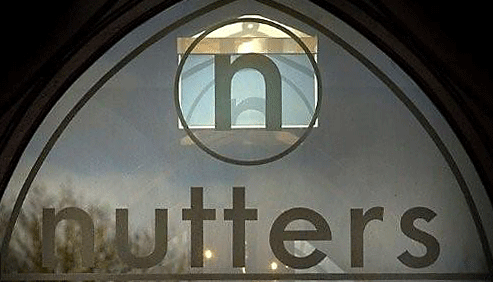
text ©2009
photos by Tim Bradley, Rochdale Observer
A gregarious and flamboyant Virgo, dynamic Andrew Nutter won his first cooking award at age 13 and opened his first restaurant named Nutters sixteen years ago at age 21 in a former pub. Within a few months it was packed every night and more awards soon followed: The Lancashire Chef of the Year, the Young Mancunian Business Man of the Year, and most recently The Northwest’s Most Favorite Restaurant, Manchester’s Restaurant of the Year 2008, and Market Kitchen’s Food Hero 2009, just to name a few.
Cramped for space, six years ago Nutter moved Nutters a few miles down the road in Rochdale, about 10 miles from central Manchester, to its present lavish 18th-century manor house, set in 6½ acre of groomed parkland with spectacular views across Ashworth Moors to Greater Manchester and beyond. (The Manor, Endfield Road, Norden, Rochdale, 0l12 7TTF, tel. 001-44-1706-650167, www.nuttersrestaurant.co.uk). Here Lucy Gordan interviewed him exclusively for Epicurean-Traveler.com.
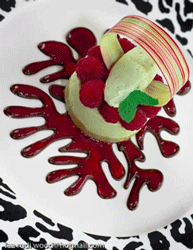
Outside his kitchen, Nutter works alongside all the main supermarket chains, endorsing and promoting regional and local produce; raises money for local charities, gives demos and master classes, is s a frequent guest on TV food shows and a judge at major cookery events in the U.K. and South Africa.
Our tastes in food are closely connected to our childhood — your first memories of food?
AN: My first memories of food, when I was about 7 or 8-years-old, are quite bizarre because my father’s was a family of butchers and sellers of cooked meats. The highlight of everything was when the whole roast pork came out of theoven. We children would sneak in and grab a crackling and run off without my Mum and Dad knowing. Those little bits that melt in your mouth along with a handful of the homemade stuffing too! Those were the ultimate occasions! We had to be careful because if Mum and Dad caught us we’d have been in for a spanking.
We’re quite a food-oriented family. Besides my father being a butcher, my Mum was a home-economics teacher. Nutters is a family business; my Dad is the floor manager; he co-ordinates everything and is in charge of the wines and spirits; my Mum is the financial administrator.
When we were growing up, my two sisters and I all had responsibilities in the butcher shop. My job was to wash all the trays and clean all the fridges after school so my Dad could finish earlier and come home to spend time with us as a family. We’re very close-knit.
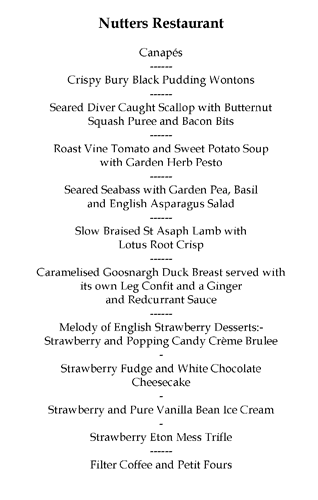
Nutters seasonal menu
At thirteen you were runner-up in The National Junior Cook of the Year Contest and then a Finalist in Daily Mail Cook of the Year Contest. What did you cook on those two occasions?
AN: A chicken breast stuffed with ginger and spring onions. I’d just been to a Chinese restaurant and wanted to give a bit of a Chinese feel to the very traditional English dish roast chicken. I sliced the breast very thinly and in between each slice slipped in a sliver of ginger and spring onions.
After winning the runner-up prize I entered every competition that came around. In the Daily Mail Contest, my dish was a mystery bag of ingredients. Because it was sponsored by the Daily Mail, which has an enormous readership, many of the contestants were thirty or forty-years-old; some were professional caterers. My recipe was a smoked haddock mousse, but my mixer wasn’t working properly, so the gelatin didn’t settle quite right. I didn’t have the experience to alter it and make it work. Anton Edelmann was one of the judges. He saw how ambitious and enthusiastic I was. I came in fourth out of eight, but Edelmann said, “Yours might be the biggest prize that anyone could want. To you, young man, I’m offering a job at the Savoy.”
Have there been other chefs in your family?
AN: My sisters are both very good cooks. My mother taught us all the basics and more; for example: How to make the pastry shells and fruit purées for homemade pies. She gave me my grounding and my traditional ways of preparing food. I try to teach these same techniques to my staff of 7 here in the kitchen.
When did you feel your “vocation” to become a chef? Is it connected to a specific event?
AN: From the sheer joy I felt as a small child when my family used to get together on a Sunday afternoon. As teenagers my sisters and I used to compete about who could make the best Sunday lunch: my sisters one week and me the next. The deal was that we cooked and my Mum and Dad cleaned up afterwards. So we didn’t mind making a big mess in the kitchen.
We all loved to cook and we participated in every possible cooking contest, which were often sponsored by household-supply companies, so we could win the latest kitchen gadgets: ovens, microwaves, dishwashers, food processors. I think it boiled down to which of the three of us could win the most. Once my younger sister Gillian won first prize: a family trip over to Florida.
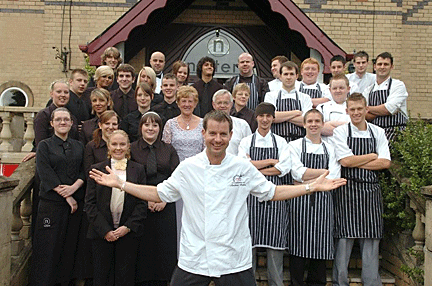
Nutter with his staff
Just out of school you were offered a job by Anton Edelmann at London’s Savoy Hotel; was he your mentor? What did you learn from him?
AN: Yes, he was by far the best mentor. We were 80 chefs, a proper brigade system, the full range of what a kitchen should be run like. Edelmann had so much time for everyone. He came round every morning; shook every one of us by the hand; knew everyone’s name; asked how we’d gotten on the day before, whether we’d had any problems, whether things could be improved. He still keeps in contact and comes up to the restaurant every so often to see how I’m doing.
At the Savoy under Edelmann I put the basics, which I’d learned from my Mum, into a real-life situation in the restaurant world. At the Savoy I could do a deluxe version of the basics I’d learned from my Mum. Those three years were an invaluable experience for me. Edelmann showed me what it was like to be a real-life chef including the tremendously long hours of the catering industry. My very first day there, at age 16, I started at 8 o’clock in the morning and didn’t finish until 10 o’clock at night, with only one half-hour break. I just thought to myself: “Well, that’s work and I’ll have to get on with it,” whereas today, youngsters will come into the kitchen and after 6 hours they are huffing and puffing and wanting to sit down. If you’re taught at a young age what hard work is, you just go for it.
After three years at the Savoy, I worked in France for a couple of years. Already I had the insight of how to work hard. Early on a French chef commented to me, “Oh my God, an English chef who actually knows how to cook. Quite an outstanding thing!” They soon picked up on the fact that I wasn’t just some dumb English bloke. The restaurant was the Chateau de Montreuil, near Le Torquet. It already had a Michelin star and they were going for two.
Other mentors?
AN: Actually my Dad taught me butchery skills.
What are the essential qualities of being a top chef?
AN: A complete understanding of food; an awareness of its quality; when a delivery is made you need toknow what you should be looking out for; inspiration, imagination, the knowledge to use only seasonal and local produce and to work closely with local suppliers.
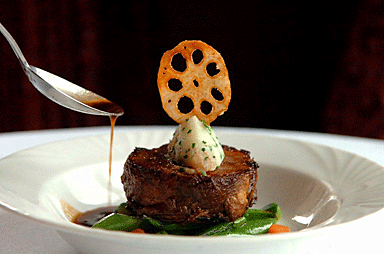
Pork with tomato chip
What do you like best about your profession?
AN: The buzz and excitement in the kitchen; working together as a team with my 7-member kitchen brigade; getting inspired by the new seasonal ingredients coming in each day; and enjoying your customers at the end of the day.
We’ve never advertized. All our new customers come through word-of-mouth. People book three or four months in advance for a table on Friday and Saturday nights and Sundays.
The least?
AN: Nothing really. Monday we’re closed. It gives me a kind of day off, but I’m always involved in local charity work or publicity campaigns. On Mondays often we host a local cooking competition, or I’m doing cooking demonstrations at local colleges, or serving as a judge in high-school cooking competitions. This way I hope to inspire the chefs of the future.
In a nutshell, what is your culinary philosophy?
AN: Modern British, using the best of local regional produce, in its season, in its prime, and cooking it simply to retain the flavors and to enhance the production methods of my local suppliers. The logo of my website says: “Not just a meal, but an adventure.”
Many top chefs have more than one restaurant; some in more than one country, why don’t you?
AN: I’m quite satisfied to have just one restaurant. It’s really a family business with my parents and me all living close by. We’ve owned this restaurant here for six years now. Prior to that we owned a smaller one two miles away down the road for ten years.
Here we can seat 150 people at a time in our main dining room with space for another 120 in our additional private dining rooms. The sheer demand for tables, with double seatings on weekends, the sheer demand of running this enterprise is enough for pleasing our client base. With me at the helm at all times I can maintain the consistent excellence of the ambience and the food.
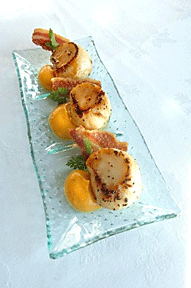
Nutters scallops and shrimp
Who are your clients?
AN: They are mostly British, but our private dinner parties are often for German businesses. We are often part of a weekend destination.
Can you give me some details about your professional connections to South Africa?
AN: Yes, I went to Capetown, Jo-burg and Durban four times last year for food festivals. Even in the airports there, there are huge posters of me. It’s mind-boggling.
Your first cookbook was immediately globally sold-out. What year was that? Is it in print again?
AN: Utter Nutter was published only in hardback in 1997 in conjunction with my TV show of the same name on Channel Five. It’s never been reprinted and the few remaining copies are only available through the internet. My new book, Nuts About Food, was due to be released two years ago, but there were production problems with the publisher, so I’m now recompiling the pictures and hopefully it will be launched later on this year. We are negotiating with three different possible publishers.
In a nutshell how would you describe your cuisine?
AN: Again, modern British. I work very closely with local suppliers and growers to get the best food available onto my customers’ plate. However, I won’t just use it because it’s grown locally. It has to be of the highest quality before I’ll even think about putting on my customers’ plate.
Your signature dish and other specialties?
AN: The “Crispy Bury Black Pudding Wontons.” You had them tonight. They’ve been on my menu for sixteen years. Wontons are dear to my heart. We dice the filling up and fry it with ginger and spring onions. Then we let the mixture cool down and bind it with a French-style chicken mousse. Then you put this mousse into wonton pastry and deep-fry it so you end up with a creation that is Chinese in style but with flavors from the little village of Bury just five miles from here. There’s a very famous market there. It’s called The Bury Market. The best black pudding in the world is the street food there.
What do you believe is the reason for your success?
AN: My passion and enthusiasm for what I do. I drive my kitchen team to get the best out of them. The restaurant has just gone from success to success. We just picked up another award last week: The Northwest’s Most Favorite Restaurant. Heston Blumenthal, the owner of the Fat Duck, in Bray, which is renowned as one of the best restaurants in the world, presented us with the award. He’s a great chap.
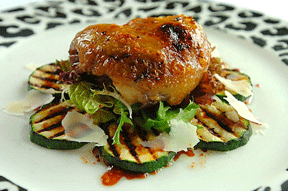
Other chefs you admire?
AN: My most favorite restaurant is Alain Ducasse’s Louis XV down in Monaco. I went there for lunch about three years ago and it had to be the best lunch I’ve ever eaten in my whole life.
What are your feelings about food critics and restaurant guides? Have they been a help to your career, or have they just added stress?
AN: As I’ve said before, we’ve never done any advertizing and the restaurant’s reputation spread by word-of-mouth, but famous critics, like Michael Winner of The Sunday Times, have raved about us. [September 24, 2006]
At the end of the day I cook the food I like to cook and in the way I want to. If critics want to give me a good rating or stars that’s fine too, but my aim is to have a restaurant full of satisfied and happy guests, who come back, but also tell their friends about Nutters. That’s how we’ve kept busy for the past sixteen years. I want my guests to relax and enjoy themselves, not to feel alienated in a posh ambience by intimidating waiters who talk in French.
Up to now you have told me about Andrew Nutter the chef, but my readers and I would like to know more about you. For example, what is your favorite food?
AN: Fish, especially brill or turbot because you can prepare it so many ways. It’s delicious steamed, roasted, fried….
On Mondays it’s bacon sandwiches. That’s my ultimate meal. They’ve got to be done right, with the right quality of bacon. You put a smidgen of olive oil into a pan, [and] fry the bacon so it’s crispy. Get some medium-sliced Warberton’s, a brand of British bread; put a slice in a pan with the bacon fat and add a smidge of goose fat, which releases all the sediments from the bottom of the pan. The bread gets crispy on one side, so you flip it over so that it gets crispy there too. Put your bacon in the middle with a dollop of crême frâiche, and you bite into that. Awesome!
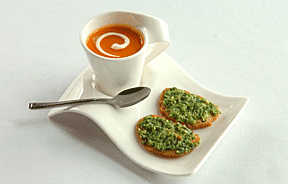
Nutters gaspacho
Is your mother your favorite cook?
AN: Yes, she used to make an awesome piping-hot pineapple meringue pudding. I still love it to this day. I’ve never been able to master it myself.
Your favorite wine?
AN: Cloudy Bay and Krug Champagne if someone is paying for it.
Flower?
AN: Purple Calla lilies.
Color?
AN: Jet black and bright orange.
A dish you don’t like?
AN: Tripe, the reason being that, when we still had the butcher shop, always at the end of the week, of all the ingredients that my Dad was selling, the only one that was left unsold was tripe. So virtually when you’ve had it one week, then the next week, again the one after that, and you’ve had it pickled, with vinegar on it… Literally if you put a plate of it in front of me now, ugh, the smell of it, I’d feel sick.
Chefs are well-known for having collections, often of motorcycles, fast cars, or watches; what about you?
AN: Watches. I have two very special Breitlings. I’ve done some publicity work for them. Because of Breitling I also have gotten involved with Bentleys. I don’t own one but they took me down to a race track near London for one or two race days. I got to spin around in one as if it were my toy.
What are your hobbies?
AN: Drinking. No seriously, I like to go to the gym in the afternoons or for a jog.
Where do you like to go on vacation?
AN: Africa, especially South Africa, for its food festivals. I’ve made so many good friends there.
If they hadn’t become chefs, Heinz Beck wanted to be a painter; Gualtiero Marchesi a pianist; Thomas Keller the shortstop for the New York Yankees; Vitor Sobral a judge; and Léa Linster an actress; what about you?
AN: A pyrotechnical or fireworks organizer. My second passion after food is fireworks.

